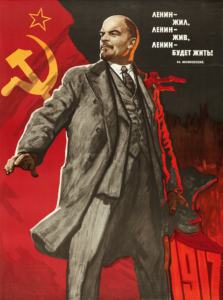 Lenin is said to have declared that the best way to destroy the capitalist system was to debauch the currency. Lenin was certainly right. The process engages all the hidden forces of economic law on the side of destruction, and does it in a manner which not one man in a million is able to diagnose.
Lenin is said to have declared that the best way to destroy the capitalist system was to debauch the currency. Lenin was certainly right. The process engages all the hidden forces of economic law on the side of destruction, and does it in a manner which not one man in a million is able to diagnose.
In the latter stages of the war all the belligerent governments practiced, from necessity or incompetence, what a Bolshevist might have done from design. Even now, when the war is over, most of them continue out of weakness the same malpractices. But further, the governments of Europe, being many of them at this moment reckless in their methods as well as weak, seek to direct on to a class known as “profiteers” the popular indignation against the more obvious consequences of their vicious methods.
These “profiteers” are, broadly speaking, the entrepreneur class of capitalists, that is to say, the active and constructive element in the whole capitalist society, who in a period of rapidly rising prices cannot help but get rich quick whether they wish it or desire it or not. If prices are continually rising, every trader who has purchased for stock or owns property and plant inevitably makes profits. By directing hatred against this class, therefore, the European governments are carrying a step further the fatal process which the subtle mind of Lenin had consciously conceived. The profiteers are a consequence and not a cause of rising prices.
This column up to this point should have been in quotation marks, with a few dots to indicate omissions. The foregoing are not my words, but the words of John Maynard Keynes. They appeared 27 years ago in “The Economic Consequences of the Peace.” If they do not apply with uncanny accuracy to conditions now, it is only because conditions now are worse. European governments today, far from resting content with denunciations of “profiteering,” decree that regardless of how much they have debased their currencies, prices in terms of those currencies must not rise. The result of this direct meddling with the market mechanism has been to distort and prevent production. And to bring on a world crisis.
This is intensified by price control of the paper currencies themselves. It has been made a crime for exporters or importers to buy or sell those paper currencies for less than their “official” rates in terms of other currencies. This has led to a violent unbalance of foreign trade and prevented all the normal processes of self-adjustment from taking place. The European governments are united, however, in describing their trouble as a “dollar shortage,” thus implying that it can only be cured by further huge loans from America.
Our own government accepts this “dollar shortage” explanation. Yet there are more dollars outstanding today than ever before. Between June of 1939 and June of this year, total demand deposits and currency outside banks increased from $33,360,000,000 to $108,500,000,000. This huge outpouring of dollars is the basic cause of the rise in prices in that period. There is more than three times as much money as before bidding for the existing American goods. We too, in short, have debauched our currency.
This is carried further when, with the help of government loans abroad, we ship to foreign countries $12,000,000,000 a year in goods and services in excess of those we receive. The $12,000,000,000 we distribute in wages, salaries, and profits in turning out these excess exports are an addition to monetary purchasing power not offset by an addition to American goods. On top of the basic increase in monetary purchasing power, these excess exports have been the main cause of the recent additional increase in prices.
But government officials, instead of recognizing this inflation as the result of their own policies, blame the business class. They start “monopoly” investigations and prosecutions which are thinly disguised attempts to put the blame for the price increase on business and to reimpose backdoor price control through intimidation. Labor leaders like Walter Reuther demand reimposition of price controls.
Lenin was certainly right.
Written by Henry Hazlitt and originally published by Newsweek ~ September 22, 1947. Republished by The Mises Institute ~ April 2, 2018
Henry Hazlitt (1894-1993) was a well-known journalist who wrote on economic affairs for the New York Times, the Wall Street Journal, and Newsweek, among many other publications. He is perhaps best known as the author of the classic, Economics in One Lesson (1946).
 FAIR USE NOTICE: This site contains copyrighted material the use of which has not always been specifically authorized by the copyright owner. We are making such material available in our efforts to advance understanding of environmental, political, human rights, economic, democracy, scientific, and social justice issues, etc. We believe this constitutes a ‘fair use’ of any such copyrighted material as provided for in section 107 of the US Copyright Law. In accordance with Title 17 U. S. C. Section 107, the material on this site is distributed without profit to those who have expressed a prior interest in receiving the included information for research and educational purposes. For more information go to: http://www.law.cornell.edu/uscode/17/107.shtml
FAIR USE NOTICE: This site contains copyrighted material the use of which has not always been specifically authorized by the copyright owner. We are making such material available in our efforts to advance understanding of environmental, political, human rights, economic, democracy, scientific, and social justice issues, etc. We believe this constitutes a ‘fair use’ of any such copyrighted material as provided for in section 107 of the US Copyright Law. In accordance with Title 17 U. S. C. Section 107, the material on this site is distributed without profit to those who have expressed a prior interest in receiving the included information for research and educational purposes. For more information go to: http://www.law.cornell.edu/uscode/17/107.shtml
